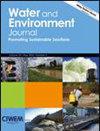饥渴的国家:巴基斯坦水资源短缺与公众节水行为调查
IF 1.8
4区 环境科学与生态学
Q4 ENVIRONMENTAL SCIENCES
引用次数: 0
摘要
由于人口激增和快速城市化,巴基斯坦正濒临成为缺水国家的边缘。本研究调查了巴基斯坦公众对水资源短缺的认识,以及他们在家庭层面对节水做法的行为和态度。研究采用了计划行为理论来更好地理解这一现象。采用定量研究方法对首都伊斯兰堡的住户进行了调查。对变量进行了描述性分析和费舍尔精确检验。结果表明,居民对水资源短缺的认识程度很高,这影响了家庭节水的积极行为和态度。值得注意的是,在洗衣、园艺和洗车等活动中,用水模式的 p 值为 0.000,具有高度显著性;而在沐浴和家庭清洁活动中,p 值为 0.003 和 0.002,显著性较低。由此得出结论,用水量受住宅特征和住宅中使用的设备类型的影响。这种全面的认识对于制定有针对性的干预措施至关重要,这些干预措施应能引起全球不同人群的共鸣。本文章由计算机程序翻译,如有差异,请以英文原文为准。
Thirsty nation: An investigation into water scarcity and public conservation behaviour in Pakistan
Pakistan is on the brink of becoming a water‐scarce country as a result of a peak in population and rapid urbanization. This research investigates the awareness of water scarcity amongst the general public in Pakistan and their behaviour and attitude towards water conservation practices at the household level. The study incorporated the theory of planned behaviour to gain a better understanding of the phenomenon. Households were surveyed in Islamabad Capital City using a quantitative research approach. Descriptive analysis and Fischer's exact test were followed to measure the variables. Results demonstrated a significant awareness regarding water scarcity amongst the residents which influenced positive behaviour and attitudes towards water conservation in the households. Notably, the p ‐value for water consumption patterns was found to be highly significant at 0.000 for activities such as laundry, gardening and car washing and less significant at 0.003 for bathing and 0.002 for housecleaning. It is concluded that water use is conditioned by dwelling characteristics and the types of devices employed in the houses. This comprehensive understanding is crucial for developing targeted interventions that resonate with diverse populations worldwide.
求助全文
通过发布文献求助,成功后即可免费获取论文全文。
去求助
来源期刊

Water and Environment Journal
环境科学-湖沼学
CiteScore
4.80
自引率
0.00%
发文量
67
审稿时长
18-36 weeks
期刊介绍:
Water and Environment Journal is an internationally recognised peer reviewed Journal for the dissemination of innovations and solutions focussed on enhancing water management best practice. Water and Environment Journal is available to over 12,000 institutions with a further 7,000 copies physically distributed to the Chartered Institution of Water and Environmental Management (CIWEM) membership, comprised of environment sector professionals based across the value chain (utilities, consultancy, technology suppliers, regulators, government and NGOs). As such, the journal provides a conduit between academics and practitioners. We therefore particularly encourage contributions focussed at the interface between academia and industry, which deliver industrially impactful applied research underpinned by scientific evidence. We are keen to attract papers on a broad range of subjects including:
-Water and wastewater treatment for agricultural, municipal and industrial applications
-Sludge treatment including processing, storage and management
-Water recycling
-Urban and stormwater management
-Integrated water management strategies
-Water infrastructure and distribution
-Climate change mitigation including management of impacts on agriculture, urban areas and infrastructure
 求助内容:
求助内容: 应助结果提醒方式:
应助结果提醒方式:


